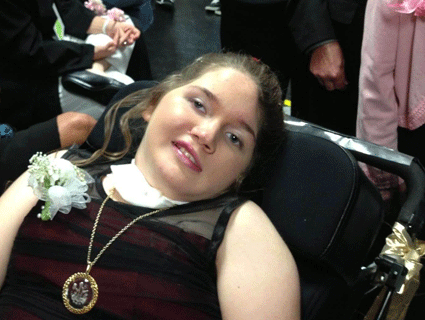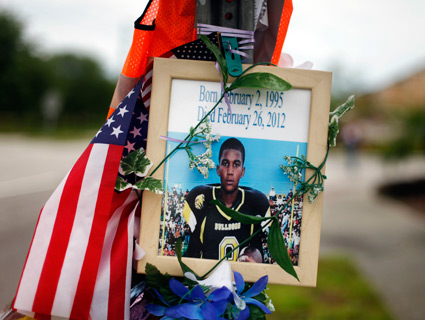The Justice Department Monday sued the state of Florida over its longstanding practice of housing medically fragile and disabled children in geriatric nursing homes, alleging that the state is in violation of the Americans with Disabilities Act. The complaint has been a long time in coming. DOJ started investigating Florida’s treatment of medically fragile and disabled kids in late 2011. It’s been warning the state ever since that if it didn’t change its practices and find a way for these kids to be cared for at home with their families or in better settings in the community, it would file suit and force the state to act.
Tea party-dominated Florida has been extremely reluctant to spend any money to provide care for this vulnerable population of children. The state even went so far as to turn down $37.5 million in federal money that would help move children out of nursing homes, all because the money was seen as part of Obamacare. Not even the threat of a civil rights lawsuit, apparently, was enough to get the state to do more.
Monday’s complaint was signed by Thomas Perez, the head of DOJ’s civil rights division who is now taking over as US secretary of labor. During his time at the civil rights division, Perez has been quietly but firmly pushing states to deinstitutionalize the mentally disabled and medically fragile. Under his leadership, the Obama administration has been the first presidential administration to systematically use the Supreme Court’s 1999 decision in Olmstead v. LC to advocate for this vulnerable population. That decision bans states from segregating disabled people in institutions or other settings.
Olmstead was a landmark decision, but it wasn’t until Obama took office that DOJ really started using it aggressively. Since 2009, DOJ has filed suit against 11 states over the discrimination against the physically and mentally disabled, and prosecutors have either investigated or intervened in ongoing private litigation in some way in many others. As a result, for instance, the state of Virginia was forced to close down several “training centers” in which it had institutionalized thousands of people with mental disabilities. Those people are now being moved into community settings or back home with their families. Similar moves are underway in Georgia, Mississippi, and elsewhere thanks to intervention by DOJ. Florida is now the latest—and probably the last such case—to be brought by Perez.
The kids at the heart of the Florida suit are children who, for instance, suffered traumatic brain injuries and are reliant on ventilators, feeding tubes, and 24-hour nursing care because they could die in five minutes if a breathing tube came loose. Many of them also have cognitive deficiencies or are paralyzed in some way. In short, their families need a lot of help taking care of them. Rather than provide that support, Florida’s response has been to push many kids into geriatric nursing homes, which are sometimes cheaper than home care but which also don’t provide children nearly the sorts of developmental opportunities they get with their families or even in foster care.
The Justice Department complaint lays out just how stingy Florida has been in the past decade when it comes to taking care of these kids. According to the complaint, even after Florida supposedly took steps this year to move more out of institutions, nearly 200 children with disabilities are still living in them, where they have only limited interaction with non-disabled people and are often far from their families and friends.
The complaint cites a March report from the Florida’s Agency for Health Care Administration, which made unannounced visits to some of the nursing homes after federal prosecutors started making noise about the conditions. AHCA found that several pediatric residents of one facility were essentially neglected for long periods. The report cited a case of a teenager in a wheelchair who, after asking for help getting out of his room, was moved to another room with three babies and toddlers who were listening to nursery rhymes and given no other form of stimulation.
Other disturbing findings emerged from unannounced health official visits that are cited in the DOJ complaint, including one facility that had 17 kids in an activity area supervised by a single adult. Another report in December found, in the same facility, that a number of children had gone for many months without a face-to-face visit with a doctor, “placing the children in ongoing and immediate jeopardy.” In response to the findings, the state of Florida simply moved the children to another nursing facility, rather than trying to place them in the community.
The DOJ lawsuit is harshly critical of Florida’s budget moves to cut services to disabled children. The complaint points out that Medicaid home health care reimbursement rates in Florida haven’t changed since 1987, a factor that has resulted in nursing shortages. Making matters worse, in 2010, the complaint says, the state cut funding for private duty nursing services by $6 million. Meanwhile, the state has raised the rates paid to nursing homes taking in medically fragile kids by more than 28 percent since 2004.
By cutting in-home care services, the state has also tried to shift the cost of care for medically fragile and disabled children onto their parents and grandparents, even older siblings, which hasn’t worked out very well as overwhelmed caregivers have been forced to put their children in nursing homes. The reduction of in-home services, DOJ says, is one reason why the number of kids in Florida nursing institutions has swelled from 136 in 2004 to more than 200 today, with many adults who entered nursing homes as children still remaining there. The complaint doesn’t say this, but many medically fragile children whose parents were forced to put them in nursing facilities have died shortly afterwards. The death rate for such children over the age of three is 50 percent higher in nursing homes than at home, according to the Miami Herald.
At least 10 percent of the disabled children in nursing homes are wards of the state and eligible for specialized foster care programs, but DOJ says the state hasn’t attempted to make such arrangements for most of these kids. In 1997, the state placed one child highlighted in the complaint into a nursing facility at the age of one. The state didn’t try to move the child in to the community until last fall, at the age of 16. In short, DOJ says, “The State has acted with deliberate indifference to the injuries suffered by the Institutionalized and At-Risk Children.”
The state is very unhappy about the lawsuit. AHCA Secretary Liz Dudek released a statement Monday disputing the allegations, saying, “Florida has made many improvements in its already strong program of caring for medically complex children and helping their families cope with their everyday challenges. Today’s Obama Administration action shows that Washington is not interested in helping families improve but instead is determined to file disruptive lawsuits with the goal of taking over control and operation of Florida’s Medicaid and disability programs.”
The agency says it has moved 31 kids out of nursing institutions and that it has improved the level of care for others. But Sue Root thinks most of the state’s effort has been window dressing. Her daughter Amy, then 9, was hit by a truck while riding her scooter in 2010 and nearly died. Sue, a former nurse, performed CPR on her in the middle of the street and revived her. But Amy suffered from a traumatic brain injury and now requires round-the-clock nursing care. She’s one of the at-risk kids covered by the DOJ lawsuit. Root has been fighting with the state for three years to keep Amy out of an institution and at home with her, but Florida has continued to try to pare back her private nursing services.
The battle enrages her. She points out that if she’d taken her daughter off life support, as she was encouraged to do in 2010 after the accident, she would have been criticized for that. Florida was, after all, the home of Terry Schiavo. But now that she’s trying to care for the daughter she saved, it’s been one war with bureaucrats after another.

After the federal prosecutors got involved in Florida, that battle was supposed to end. But just a few weeks ago, Sue says the state again moved to cut Amy’s nursing hours back from 24 to 20. “I think they’re trying to make it look like they were fixing things so everybody would forget about it,” she says, noting that she is ecstatic about the DOJ suit. “Now [state officials are] going to be held accountable, and that’s what the children need.”
The DOJ intervention has already had other impact in Florida by bringing heightened scrutiny to the facilities to which disabled kids have been confined. Late last year, I visited Lakeshore Villas, a Tampa geriatric nursing facility where Abdel Rahman Gasser, then 17, was living because his family couldn’t get in-home services to care for him in their apartment. In June 2011, Gasser had suffered a traumatic brain injury in a car accident that left him largely immobile and unable to care for himself, and he has been in the nursing home ever since leaving the hospital.
Lakeshore Villas, which kicked me out when I visited Gasser with his father, was one of the worst nursing homes in the state, and state and federal regulators have repeatedly fined it for endangering residents. Last year, according to the Miami Herald, state inspectors—spurred by DOJ—investigated the facility and found that:
Lakeshore “failed to provide meaningful, chronological age and developmentally appropriate structured activities” for two of the three children the agency observed closely on March 7, the day of an inspection. Entire days went by, the report said, without any documentation of activities staff entering the pediatric ward. One visit lasted less than 30 minutes.
Earlier this month, federal regulators cut off all Medicaid and Medicare funding to the facility, which effectively shut it down. The kids in the facility will be moved elsewhere before it closes for good in early August. Gasser’s father, Gamel, is scrambling to find a new home for his son. He says the state has been telling him that he “might” be eligible for a program that would let Abdel come home, but the details have been vague and confusing, and what he calls offers of “just hope and air. And I cannot make decisions on that hope. I wish there was a definite answer.” One thing he doesn’t want to do is put his son in another nursing home. In theory, the DOJ lawsuit might help. Whether that help will come soon enough for Abdel is an open question. But it’s clear that’s what prosecutors are hoping for.
In a statement Monday announcing the suit, Eve Hill, deputy assistant attorney general for the civil rights division said, “Florida must ensure that children with significant medical needs are not isolated in nursing facilities, away from their families and communities. Children have a right to grow up with their families, among their friends and in their own communities. This is the promise of the ADA’s integration mandate as articulated by the Supreme Court in Olmstead. The violations the department has identified are serious, systemic, and ongoing and require comprehensive relief for these children and their families.”









